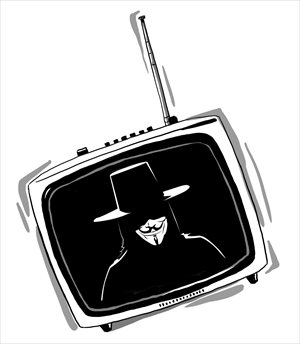Movie not a sole standard measuring media progress

Every now and then, observers of China's media scene read into signs that they hope may show them where the wind is blowing for the country's censorship policy. On a recent weekend, State media CCTV broadcast the uncut version of V for Vendetta, a 2005 movie adaptation about a lone revolutionary seeking personal revenge and overthrowing a government, a surprise giving free rein to the wildest imaginations.
The film contains many inflammatory quotes such as "Ideas are bullet-proof." Years after its debut, V for Vendetta is causing another stir. But since its beginning the film has been controversial because of its advocacy of terrorist attacks and violence. Possibly for being close to the bombings in London in July 2005, its Europe premiere had to be postponed.
Though the film is set in London and depicts the UK as a depressing state ruled by a dictator, it carries the usual tone of mockery against regimes that are deemed as undemocratic and suppressing.
Naming the dictator Adam Sutler, a clear reference to Adolf Hitler, the movie wisely avoids any embarrassment of recent UK authorities.
There are many ways to gauge the progress of media freedom. The juggernaut CCTV has made a variety of attempts in this regard.
Some are straightforward, for example exposing through investigative reporting the machinations a large profiteering furniture-making company. Some are less traditional, such as revealing via a presenter's personal microblog the hidden rules of the yogurt industry such as using harmful gelatin.
Throughout China's media system, there are direct or indirect opinions against certain censorship policies.
But V for Vendetta seemed to attract particular attention due to its calling for the masses to vehemently overthrow their rulers.
Media freedom is a goal that is worth working relentlessly to reach, but how much an unchecked media can positively contribute to a country's development is a debatable question.
Equaling media freedom to encouraging confrontation and unlimited criticism against the government is almost a cliché.
Dissatisfaction is spreading in Europe given the widening wealth gap and stagnant growth. The Guy Fawkes mask that the protagonist V wears was omnipresent in the Occupy movement across the globe in protest against greedy capitalists. It is worth wondering what the reaction would be if movie producers set up the privileged classes back home as the target of a mass uproar in a film.
Those who are eager to see dramatic change in China's system, inside and outside the country, often make similar inferences in many other movies. When Batman: The Dark Knight Rises was screened in China in September, some audiences saw the eventual fall of masked villain Bane as a symbol of a dictatorship being prevailed upon by a freedom-yearning population.
From the perspectives of censorship and political reference, V for Vendetta generated much fewer meaningful discussions than Back to 1942, a recent blockbuster by Feng Xiaogang that depicts a devastating famine in China in 1942. It raises serious questions about government integrity and how media can crucially break news stories.
V for Vendetta being broadcast on CCTV created a brief cyber sensation among Chinese netizens, but soon gave way to new eye-catching stories such as scandals involving officials and the latest leadership appointments in several provinces.
In fact in China's robust Weibo sphere, where the most active ideas are often exchanged, quotes as V for Vendetta contains are often seen and hardly cause a fuss.
The film being aired on CCTV can be seen as a diversified offering of entertainment programs in today's China. Hailing it as a barometer of China's media censorship is amusing but ludicrous.
The author is a commentator with the Global Times. opinion@globaltime.com.cn